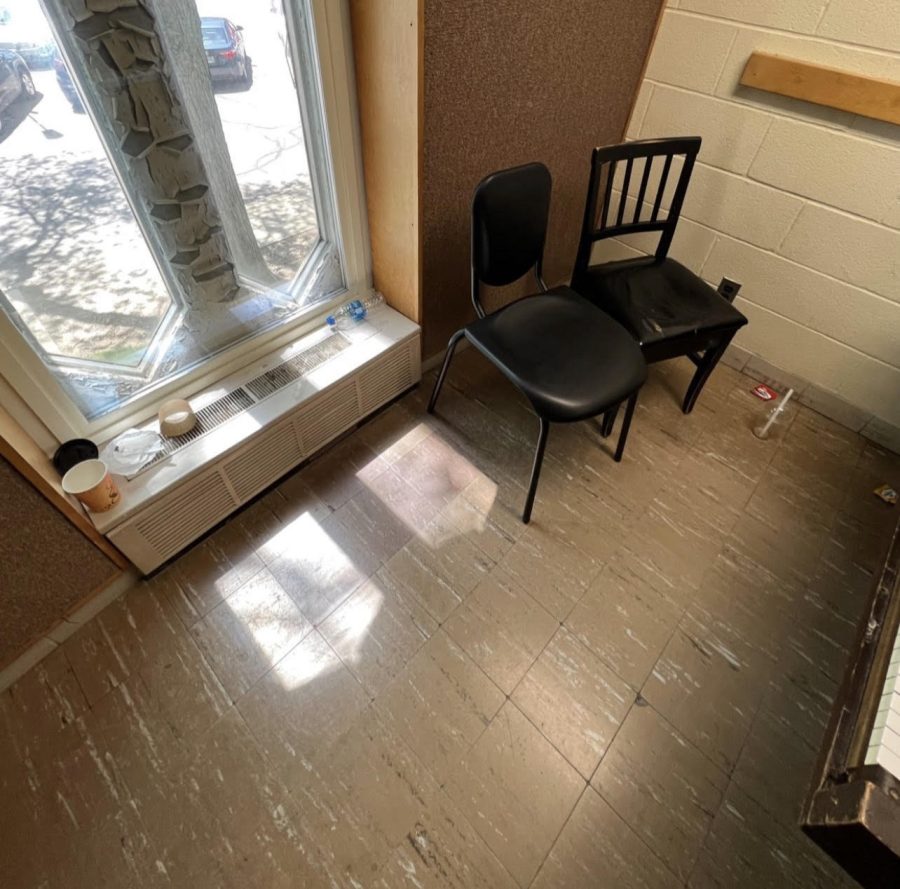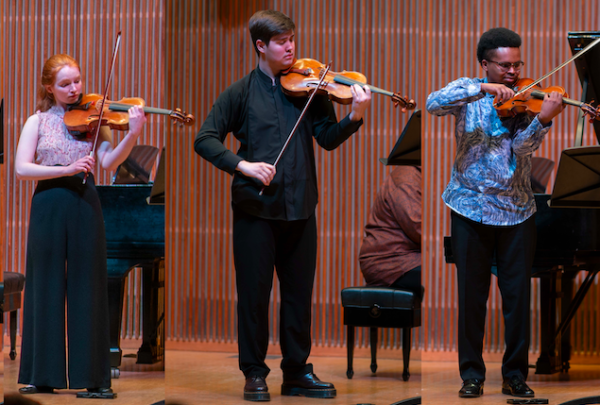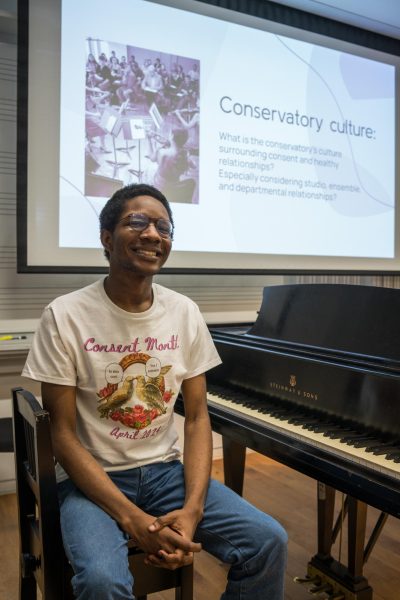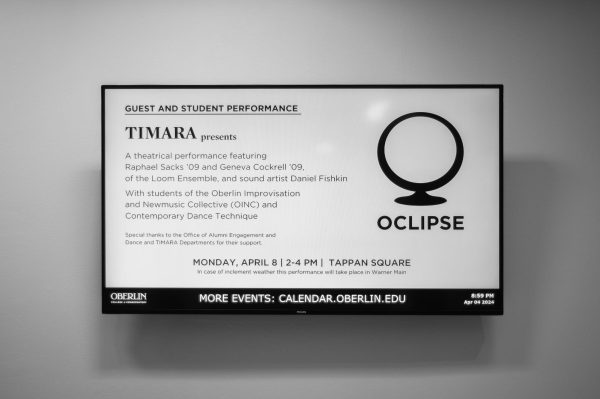Fingernails, Food Bowls, and Fries: Students Trash the Robertson Practice Rooms
Food bowls line the windowsill of Robertson Hall Practice Room
Picture this: toenails on piano keys, wads of gum underneath the piano keybed, rotten food festering in discarded food bowls, coffee stains on a piano lid, and greasy fries on the floor. While you might think this image comes out of a junior high school band room, it is in fact a description of some of the practice rooms in Robertson Hall, the building that houses practice rooms for Conservatory students.
Conservatory second-year and Classical Voice major Benhur Ghezehey has carefully documented the wide range of waste he has encountered, from leftover food bowls to discarded Amazon boxes.
“I find stuff and I just write: food and drink waste; coffee spills on the floor, on the piano; water everywhere,” he said.
Unfortunately, Ghezehey has also discovered some waste that is not just an eyesore, but is also nauseating.
“There are toenails and fingernails all over the place,” he said. “There are a lot of hairballs and smelly food bowls that have been there for some time, just on top of the piano. There is food grease on the piano keys and gum under the piano that sticks to your hand or sometimes your trousers.”
For Ghezehey and other students, the trashing of Robertson is the most visible scar of a much deeper wound — that some Conservatory students fail to recognize that the rooms and equipment they use are shared among their peers.
“It starts with the obvious problem that people are hoarding the space,” he said. “People will put their scores or their jackets inside a room [to signify it is theirs] and then be gone for two hours or an entire class time. When they reserve that space, they don’t give other people a chance to play.”
Ghezehey explained how the tendency of Conservatory students to reserve spaces creates a vicious cycle. As more and more rooms are reserved, there is a greater demand and students will be more likely to continue to reserve rooms. It should be noted that it is a violation of Conservatory policy to reserve rooms in Robertson by simply leaving your belongings there.
“It just creates a positive feedback loop because the more they reserve, the more scarcity there is, and the more others suffer,” he said.
Although, from an outsider’s perspective, the behavior of some Conservatory students might simply be a product of absentmindedness mixed with carelessness, Ghezehey noted that students have developed creative ways to ensure that rooms they want to use are reserved in their absence.
Each practice room door contains a small window that allows others to peer in and check whether the room is available. Students frequently place jackets on raised music stands to obscure an outsider’s view into the room, thus preventing others from being able to determine whether the room is available.
An eerie feeling results from the collective action of students who decide to reserve rooms they are not actually using, Ghezehey explained. On a certain floor in Robertson, all the practice rooms might be occupied — or appear to be occupied — but there is no audible music. Ghezehey must wait patiently for someone to return to a room and retrieve their belongings.
“The halls are quiet — no music at all — but the rooms are full and no one is in them,” he said. “I sometimes wait for 15 minutes for someone to come, and I obviously could remove their stuff, but I don’t want to be disrespectful.”
The garbage problem in Robertson is compounded by warmer air temperatures and greater humidity brought on by the spring weather and by the recent malfunctioning of the Conservatory air conditioning systems. Food that would normally remain fresh for longer periods of time is rotting faster and producing noxious smells, which have proved to be a threat to the health of Conservatory vocalists like Ghezehey who rely on clean air to breathe.
“It’s also a health hazard, especially now that we are in the spring and the rooms are overheated, stuff is going to smell bad [fast and] rot,” he said. “Fungus is going to grow. Bacteria is going to grow. How is it going to be a practice room? It’s going to be garbage. Who goes to [the] garbage and sings? Maybe raccoons.”
In Ghezehey’s view, the trash problem in the Conservatory practice rooms serves as an uncomfortable reminder of the disregard some students have for the labor of Conservatory custodians, who work late into the night after many students have left.
“The Conservatory students are the ones who have no regard for the working class — if you are leaving food there, if you are leaving trash and garbage there and expecting others to come and clean up after you, that is a pattern of disrespect,” he said. “Music belongs to the masses, and if you cannot treat yourself with humility and grace, then you’re not a musician. I think you can never be a musician if you can’t exercise compassion, solidarity, and responsibility toward the custodians.”
For first-year pianist Victor Shlyakhtenko, the trash is a symptom of a larger problem.
“The students’ treatment of the facilities conveys a general sense of carelessness for both the instruments and those who maintain them. Without Oberlin’s piano technicians, our pianos would quickly fall into disrepair; without pianos, pianists would be mute. What’s more, littering discourages the administration from taking better care of practice instruments — why allocate resources to the upkeep of pianos when students show such disrespect?”
Second-year pianist Grace Tubbs put it succinctly:
“People should clean up after themselves,” she said.






